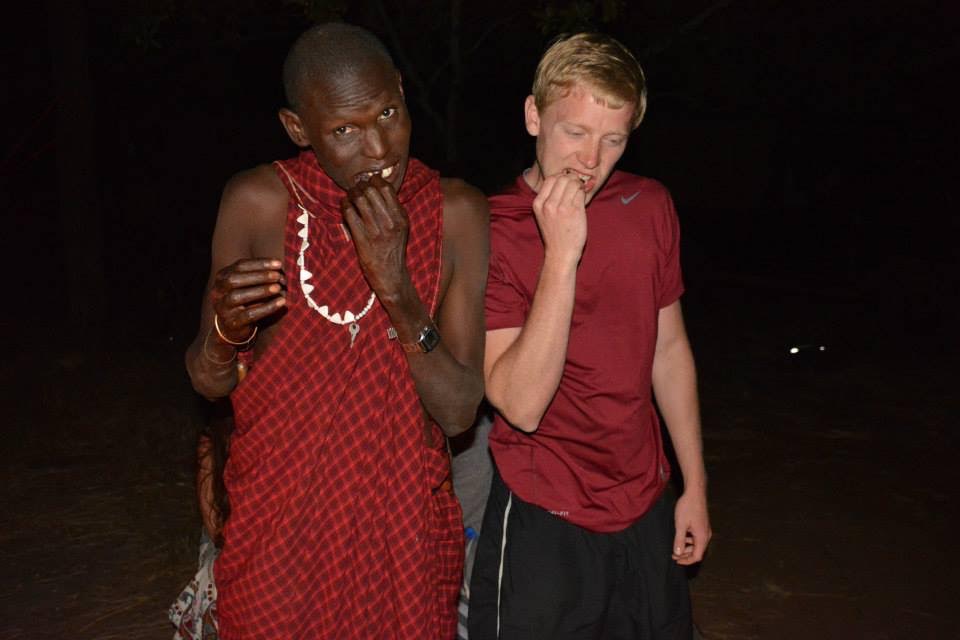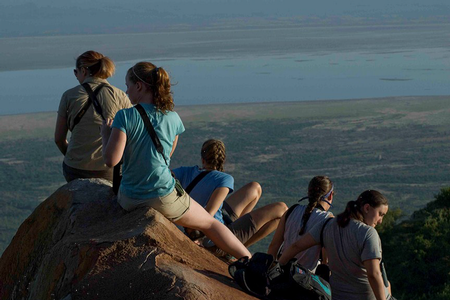Global Seminar Spotlight: Conservation & Indigenous Peoples in Arusha, Tanzania
One of our key goals in international education is to support students in developing long-term connections with host cultures, continuing to build bridges years after the program has ended. For CU students Conner Knickel and Alex Dudley, a summer spent in Tanzania on the Conservation & Indigenous Peoples Global Seminar was the jumping off point for near-continuous involvement in the local communities of northern Tanzania.

Exploring globalization and development and linking these issues to indigenous communities in Tanzania, this program will be running in summer 2017 for the first time since 2013.
One of our key goals in international education is to support students in developing long-term connections with host cultures, continuing to build bridges years after the program has ended. For CU students Conner Knickel and Alex Dudley, a summer spent in Tanzania on the Conservation & Indigenous Peoples Global Seminar was the jumping off point for near-continuous involvement in the local communities of northern Tanzania.
Exploring globalization and development and linking these issues to indigenous communities in Tanzania, this program will be running in summer 2017 for the first time since 2013.
Tanzania is the site of the largest wildlife migration on Earth, where nearly a quarter of all land is protected as game reserves, national parks, etc. In a country like this, the interactions between humans and their natural environment are defining political issues. This program invites participants to critically examine competing theories of conservation on-site. Specifically focusing on the interface between local communities (including the Maasai, Iraqw, and Hadzabe) and broader forces of globalization and development, the program allows participants to explore remote areas through culturally-oriented treks that sustainably benefit remote indigenous communities.
Conner Knickel participated in this program in 2013, and he’s been busy in the intervening time. He received his diploma in the mail when he graduated in spring 2015, as he was back in Tanzania at the time. He was working with the Dare Women’s Foundation—a local non-profit that works to empower rural Tanzanian women and girls through initiatives fighting poverty, gender discrimination, and much more. Conner first connected with Dare over the course of the Global Seminar and he continues to participate in their mission remotely even though he’s back in the United States. He has helped refine the foundation’s bylaws, taught basic business principles to women entrepreneurs in Machame, and helped with logistics and fundraising to drill a well in the Kabuku region that currently provides an estimated 3,500 people with clean water.
Fellow Conservation & Indigenous Peoples alumnus Alex Dudley has also continued his involvement in Tanzania. Alex describes his current work as “researching technologies to mitigate human-wildlife conflict outside Arusha National Park so that elephant migratory corridors there can be restored.” His plans include the reintroduction of black rhinos to the area. Says Alex, “[This program] opened my eyes to the fact that safeguarding rhinos, elephants, and other iconic species cannot rest on biological science alone and must be a holistic process involving and enfranchising local people who live alongside wildlife.” In the future, Alex hopes to return to assist with the creation of an education center highlighting the area's cultural and natural heritage, with a goal of instilling local pride and ownership of the ecosystem's assets.
Stories like these are what keep us excited to come to work every day. We are so proud of Conner and Alex, and wish the very best for them both as they continue their involvement in Tanzania.
Conner Knickel participated in this program in 2013, and he’s been busy in the intervening time. He received his diploma in the mail when he graduated in spring 2015, as he was back in Tanzania at the time. He was working with the Dare Women’s Foundation—a local non-profit that works to empower rural Tanzanian women and girls through initiatives fighting poverty, gender discrimination, and much more. Conner first connected with Dare over the course of the Global Seminar and he continues to participate in their mission remotely even though he’s back in the United States. He has helped refine the foundation’s bylaws, taught basic business principles to women entrepreneurs in Machame, and helped with logistics and fundraising to drill a well in the Kabuku region that currently provides an estimated 3,500 people with clean water.
Fellow Conservation & Indigenous Peoples alumnus Alex Dudley has also continued his involvement in Tanzania. Alex describes his current work as “researching technologies to mitigate human-wildlife conflict outside Arusha National Park so that elephant migratory corridors there can be restored.” His plans include the reintroduction of black rhinos to the area. Says Alex, “[This program] opened my eyes to the fact that safeguarding rhinos, elephants, and other iconic species cannot rest on biological science alone and must be a holistic process involving and enfranchising local people who live alongside wildlife.” In the future, Alex hopes to return to assist with the creation of an education center highlighting the area's cultural and natural heritage, with a goal of instilling local pride and ownership of the ecosystem's assets.
Stories like these are what keep us excited to come to work every day. We are so proud of Conner and Alex, and wish the very best for them both as they continue their involvement in Tanzania.
Last Updated December 2016
